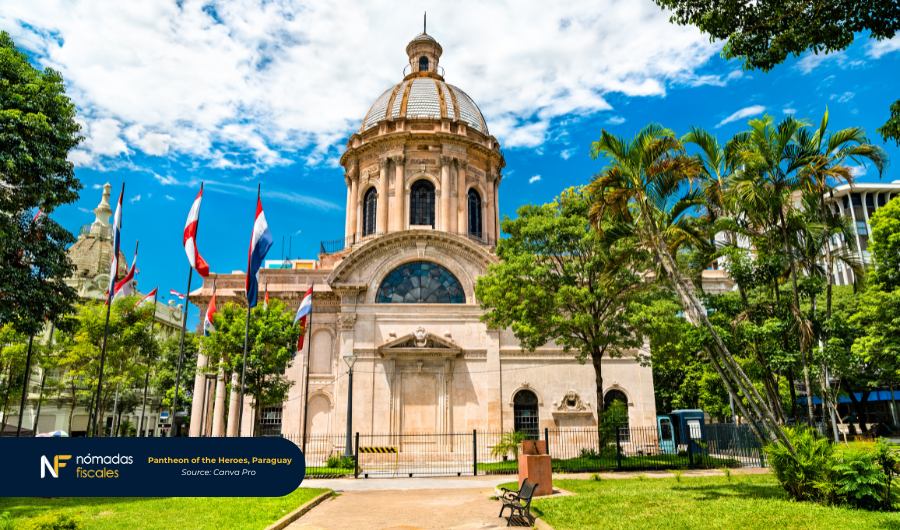Is it really possible to sell crypto without paying taxes?
Every year, countless digital nomads, investors, and traders ask the same question. The answer is: yes, it’s possible—and legal. But not just anywhere.
In a world where governments are tightening fiscal controls and cross-border data sharing becomes increasingly automatic and global, finding jurisdictions that offer a 0% tax rate on cryptocurrencies may sound like a mission impossible. Yet the truth is, there are still Crypto Tax-Free Countries, and in 2025, they remain legal and accessible options—if you know how to use them.
In this article, we explore the 10 best countries where you can legally avoid paying taxes on crypto in 2025, breaking down their tax systems, crypto regulations, and—most importantly—how you can benefit from them without legal risks.
Get ready for a global journey through destinations like Panama, the UAE, or Paraguay—and also through European countries like Portugal, Spain, or Cyprus—that continue to offer attractive tax regimes for those looking to optimize their crypto tax strategy.
Paraguay – 100% Crypto Tax Exempt

Paraguay is, for many, one of the best-kept secrets on the global tax map.
While it still lacks a fully developed crypto regulatory framework, the country combines an extremely favorable tax regime for individuals with one of the simplest and most accessible residency programs in the world.
As of today, cryptocurrencies are not recognized as legal tender nor directly regulated by the Central Bank. However, this doesn’t mean legal uncertainty—quite the opposite: individuals are taxed at 0% on any capital gains from crypto as long as they are not operating as a business.
All of this comes with a unique advantage: you can obtain tax residency in Paraguay without living there full-time. By registering for a RUC (local taxpayer number) and meeting a few basic requirements, you can become a tax resident—giving you access to official tax certificates under double taxation treaties.
Paraguay offers a simple tax structure, no taxes on foreign income, an extremely low cost of living, and an economy that’s just beginning to take off. It’s not only crypto-friendly: it’s one of the most useful crypto tax-free countries for building a grounded and sustainable international tax strategy.
If you want to learn more about the benefits of becoming a tax resident in Paraguay and how to leverage them in your international setup, we break it all down for you in this in-depth guide.
Panama – Territorial Tax System and Zero Crypto Taxes

Panama is one of the all-time classics when it comes to tax optimization.
Its territorial tax system means that both individuals and companies do not pay taxes on foreign-sourced income, including capital gains from cryptocurrencies, dividends, or interest.
Regarding crypto regulation, Panama is still in development phase. In 2025, a new legislative proposal has been introduced to regulate crypto service providers (VASPs), establish KYC/AML standards, and allow for voluntary payments in BTC, ETH, or stablecoins. There are even local initiatives underway—for example, in Panama City, certain municipal taxes can now be paid in crypto.
In addition, Panama does not apply CFC rules or effective management tests, making it a very attractive jurisdiction for building international structures.
And beyond the tax benefits, Panama City stands out for its quality of life, air connectivity, modern urban environment, and a thriving international community.
If you want to better understand how to establish tax residency in Panama and benefit from its exemptions, we’ve published a full guide with everything you need to know.
Dubai (United Arab Emirates) – The Crypto-Friendly Oasis

The United Arab Emirates, and especially the well-known Dubai, have become one of the most solid destinations for those who want to live, invest, and operate in crypto with full legal certainty.
From a tax perspective, there’s no personal income tax or capital gains tax for tax residents. This means that if you become a legal resident in Dubai, you won’t be taxed on your crypto gains—not for trading, staking, mining, or even NFT sales. Since 2024, crypto transactions are also exempt from VAT, making Dubai even more appealing for digital asset investors.
The regulatory framework is also one of the most advanced in the world. Authorities like VARA in Dubai, ADGM in Abu Dhabi, and the federal SCA actively supervise crypto-related activities, issuing specific licenses to businesses and ensuring a clear, stable legal environment.
Now, Dubai may not be for everyone. The high cost of living and extreme summer weather can be a challenge. But the quality of life, safety, pro-business mindset, and international connectivity have turned it into one of the world’s top-rated tax residency hubs.
Curious about how tax residency in the UAE works? We break it all down for you in this article about the Emirates.
Cyprus – The Crypto Tax Haven of Europe

If you’re looking for a flexible, legal, and crypto-optimized tax residency, Cyprus should be high on your list.
While there’s no crypto-specific tax law, general rules allow capital gains to be taxed as personal income, which in practice means a small 2.65% GESY contribution on gains up to €180,000 per year.
If you qualify for the non-dom status, you’ll also be exempt from paying taxes on foreign dividends and interest for up to 17 years. And if you invest passively, capital gains from crypto and other assets like stocks are also tax-exempt.
All this in a country with 320 days of sunshine, no toll roads, and free public healthcare and education, plus access to the European Health Insurance Card. It offers a higher quality of life than many more expensive (and less crypto-friendly) European destinations.
Cyprus is quickly becoming one of the top tax and tech hubs in Europe, especially for international profiles seeking legal stability, flexibility, and public coverage without giving up fiscal efficiency.
If your goal is to lower your tax burden, live in a pleasant environment, and build a solid European base, this island might be your next smart move.
Curious about how crypto taxes work in Cyprus? Check out our full article on Cyprus where we explain how to obtain tax residency and take full advantage of its crypto-friendly setup.
Dominican Republic – No Crypto Taxes in the Caribbean

Although crypto regulation in the Dominican Republic is still underdeveloped, the country neither prohibits nor penalizes its use. Cryptocurrencies are not legal tender nor backed by the Central Bank. However, the local tax authority (DGII) does address their taxation: gains are only taxable when converted into Dominican pesos.
What stands out for tax nomads is not so much the crypto framework —still emerging— but the country’s overall tax system. The Dominican Republic applies a territorial tax system, which means that fiscal residents only pay taxes on income generated within the country, while foreign income (including crypto capital gains) is completely tax-exempt.
That said, this advantage is limited to the first two years, unless you obtain a special residency as a retiree, investor, or pensioner. With these special residencies, foreign income becomes tax-exempt indefinitely, opening the door to much more ambitious tax planning.
If you want to learn how to benefit from the Dominican Republic’s tax and migration advantages, we’ve prepared a detailed guide on how to get residency and leverage the country’s crypto-friendly policies.
Portugal – 0% Tax on Long-Term Crypto Holding

Portugal was for years one of the top destinations for crypto investors, thanks to its famous 0% tax policy. Although things have changed, it still offers major advantages if you know how to navigate the system.
Since 2023, crypto gains are taxed if you sell within 12 months. In that case, you’ll pay 28% on your profit. But if you hold your crypto for over a year, you won’t pay anything when selling, as long as the transaction happens within the European Economic Area or countries with tax agreements with Portugal.
A key detail: crypto swaps (e.g., BTC to USDT) are not taxed in Portugal, unless done very frequently and considered a professional activity. This allows you to make strategic moves without triggering taxes, such as switching to a stablecoin at the right time and waiting over 12 months before selling.
However, income from staking, mining or other crypto-related activities is taxed as personal income, reaching over 50% in some cases.
Portugal is no longer for everyone, but it remains a solid option if you invest with a long-term mindset and plan your exits carefully.
Are you considering Portugal for tax residency? We’ve published a detailed guide on its current benefits.
Spain – Beckham Law and 0% Tax on Cryptocurrencies

At first glance, Spain doesn’t seem like the best country to operate with cryptocurrencies. Capital gains from the sale or exchange of crypto assets are taxed between 19% and 30%, depending on the profit. Additionally, the Spanish Tax Agency has strengthened controls with new reporting requirements (Forms 720 and 721), requiring you to declare your crypto assets if they exceed certain thresholds and are held abroad.
But there is one nuance that changes everything:
Thanks to the well-known Beckham Law, certain foreigners who move to Spain for work reasons can only be taxed on their income generated within Spain. This means that if you sell cryptocurrencies through a foreign exchange and keep them in self-custody, you won’t pay taxes in Spain on those profits.
However, to benefit from this, you must not have been a tax resident in Spain in the past five years, and you must relocate under an employment contract or entrepreneurial project. If you meet the requirements, you will pay a flat 24% tax on income from your work up to €600,000 for six years, and all your crypto earnings from foreign sources will be tax-exempt.
Are you interested in understanding how this option works and who can apply? In this article we explain in detail the requirements and advantages of the Beckham Law in Spain.
El Salvador – No Crypto Taxes and Bitcoin Passport

El Salvador has earned a place on the global map of tax nomads thanks to its bold bet on the crypto world. It was the first country to declare Bitcoin as legal tender, and although the obligation to accept it as a means of payment has recently been softened, cryptocurrencies remain legal and operate under a specific and friendly framework.
From a tax perspective, El Salvador is hard to beat: capital gains from cryptocurrencies are tax-exempt, both for residents and non-residents, as long as operations are carried out within the local legal framework. In addition, there are no taxes on wealth, inheritances, or donations, and the country does not apply exit taxes, which grants a lot of freedom to structure wealth and businesses.
For those looking to go beyond personal use and build something within the ecosystem, there are special licenses for crypto companies, such as the Bitcoin License or the DASP, offering additional tax benefits: full exemption from income tax, VAT, and capital gains related to digital assets.
And if you’re wondering how to legally establish yourself in the country, El Salvador offers several very accessible residency options, such as the rentista permit, retiree permit, or even by investment.
Additionally, its naturalization-based citizenship system, along with programs like the Freedom Passport —which allows you to obtain a Salvadoran passport through a donation in Bitcoin or USDT— makes it an excellent Plan B migration option that comes with a passport.
Want to understand all the tax, migration and strategic advantages El Salvador offers in depth? We break it all down in this article on residency in El Salvador.
Thailand – Tax Exemption on Crypto and Foreign Income

Thailand has long been one of the favorite destinations for tax nomads — and not just because of its beaches, food, or cost of living. It has also started gaining attention for its (relatively) friendly approach to cryptocurrencies, as long as you know how to navigate within the Thai legal framework.
Since 2025, the country offers a five-year tax exemption (until 2029) on capital gains generated from crypto assets — but only if operated through regulated Thai exchanges. This has turned platforms like Bitkub or Bitazza into strategic allies for those looking to buy, sell, or “hodl” without triggering taxes.
And what happens if you use foreign platforms? Well, that changes things: those gains are no longer exempt and may be taxed up to 35%, depending on the volume and whether the Thai Tax Authority considers you’re conducting an economic activity (such as regular trading, for example).
The most interesting aspect of Thailand is that it also operates a remittance-based system under which no foreign income is taxed unless the money is brought into the country. So if you conduct your operations from abroad, keep the funds outside Thailand and don’t transfer them locally, the local tax authorities won’t touch them. This keeps a window of optimization open — one that many tax nomads are already taking advantage of.
On top of that, there are several ways to legally reside in the country, such as the retirement visa, the Privilege Visa (formerly Elite Visa), or even the new Destination Thailand Visa aimed at digital nomads. All of them allow for extended stays in the country with considerable flexibility.
Uruguay – 0% Crypto Taxes and Territorial Taxation

Uruguay is not only one of the safest and most stable countries in Latin America, it has also become an increasingly attractive destination for those managing crypto capital and seeking a long-term, well-structured tax residency.
Thanks to its territorial taxation system, new tax residents can be exempt from paying taxes on capital gains, passive income, or crypto profits generated abroad. This includes gains from trading on international exchanges, as long as the operations are not conducted from Uruguay or do not have direct economic effects in the country.
But the most interesting part is that this benefit is not limited to the first year: if you plan well, you can enjoy this tax exemption for up to 11 years, or even opt for a reduced tax rate of 7% permanently on dividends and interest.
And what about cryptocurrencies? Although the Central Bank does not consider them legal tender, the tax authority does take them into account. In practice, occasional peer-to-peer transactions are not taxed, while regular crypto business activities—such as mining, staking, or related services—can be subject to taxes if carried out from within Uruguay. However, if you operate from abroad and simply appear as a tax resident in Uruguay, your international crypto activity can remain completely off the tax radar.
In addition, the country offers flexible visas and investment routes to obtain tax residency without the need to live there year-round. For example, with a real estate investment of just over $500,000 USD, you can obtain 0% tax residency and only need to spend 60 days per year in Uruguay. A perfect solution for fiscal nomads who value their freedom of movement.
Want to know the full requirements, visas, and investments that allow you to get it? Here we explain step by step how to establish your tax residency in Uruguay.
Are you looking for the best country to pay less tax on your crypto?
We can help you find the best option for you!
Simply request your FREE INITIAL CONSULTATION BY CLICKING HERE, or contact us directly via WhatsApp or through the form below.
Contact us

